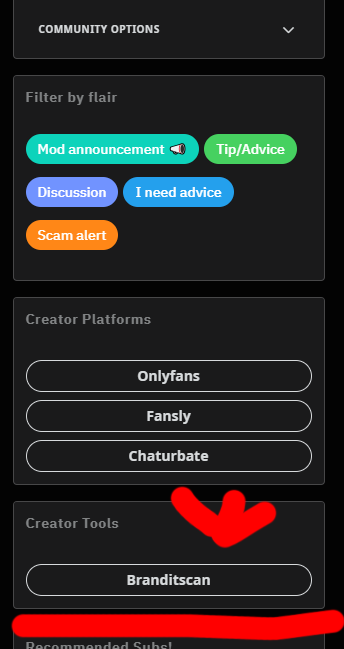There are so many invaluable resources out there for adult content creators, and I love it. Years ago, it was nearly impossible to try and get help with performer-related issues. Twitter was pretty much our only resource.
I worked with Alana Evans, president of the APAG Union, to create Performer.Training, but you had to know someone who knew about the site to get to it. And even then, it was just about sharing specific advice. There wasn’t really a place you could go and ask questions about random things.
Times have changed, and we can really thank platforms like OnlyFans for this one particular change. Because there are now so many content creators, new resources have popped up, including Telegram groups and subreddits dedicated to helping content creators.
The problem is — not all advice is good advice.
One particular person who goes by the name of “SansaAdvice” on Reddit created her account just ten months ago. She previously went by the name “Sansa Starkers,” and she seems to have at least at one time been a faceless content creator posting on a now-removed OnlyFans page.
One day, another created asked if it was a good idea to use one of those DMCA takedown services. This was my response ….
Please please please be careful before using these DMCA services because they are very problematic. I wrote a long ass article explaining why but the long and short of it is, most of these services don’t put in the effort to make sure they are really demanding YOUR content be removed and in the end that could come back on you.
This Sansa woman got super offended by my reply and started going on about how my reply was stupid.
“I haven’t read such rambling nonsense in a long time. You are not going to get sued by a leak site because you used a dmca takedown service to have your content delisted from google. It is not illegal to appoint someone to represent you and file a complaint on your behalf. A leak site would have approximately 0 legs to stand on.”
That wasn’t what I said. I never said that one of those stupid leaked sites would or even could sue you for using a DMCA takedown service. Nor did I say it was illegal to appoint someone to represent you and file DMCAs on your behalf. She just pulled that out of her ass.
The problem is that someone could, in fact, sue you based on the action of a DMCA service you hired. I’m not a lawyer, so I won’t get into the down-and-dirty details of how that might play out, but I can share with you a story of a girl I know.
A content creator I know from the UK hired one of those DMCA services. They sent out DCMA requests on her behalf using an automated system, as most do – this is the most cost-effective for them.
They did not check their work and DMCA’d a legitimate website.
This website has posted the promo that the content creator had paid for a few months ago.
Not read this part carefully again — the content creator paid for promo a few months prior. This particular website had posted that promo (on her behalf), and the DMCA service sent a takedown notice and filed a copyright claim with Google, hurting the website’s SEO.
This site decided to pursue this matter legally, and while in the end, it was quietly settled, it still cost the girl her time and money to hire a lawyer to help her with the matter.
Sending out a false DMCA in the US is under penalty of perjury and could be considered a felony under certain circumstances. This girl got lucky that she lived in the UK, and the company just decided it was easier to do a deal with her than to try and fight an international ordeal. But you can’t always hope you’ll get lucky. You have to try and be careful not to get yourself into these situations in the first place.
And in the end, this whole thing still cost her money to hire a lawyer to protect her in the first place.
Nobody wants to spend money on lawyers when they don’t have to.
But this girl had to because she was facing legal trouble because the DMCA company she hired filed a false DMCA in her name – on her behalf.
So yes, I stand by what I said – always think twice before hiring a DMCA service. Not all of them are bad. But most are lazy. They use automated scraping techniques to try and find your name and just submit the claim without really checking if, in fact, the website should really be DMCA’d in the first place.
Sometimes, and I mean quite often, the website in question doesn’t even feature photos or videos of you. How does that happen? Let me tell you about Saturday.
Saturday seems like a normal word, right? But if those scrapers are scanning the web for the word “turd” do you know what they will also pick up on? Saturday. This is known as a false flag, and it’s a very common problem with those sub-par DMCA services.
And since they are issuing these LEGAL complaints on your behalf, you are, in the end, the one who is ultimately responsible.
As far as SansaAdvice goes. It might not surprise you that she’s the mod of a couple of creator groups on Reddit, and what service are they promoting as a paid affiliate?

The very company I happened to mention in my original article that I posted about on Reddit that she got so upset about she banned me from her creator group.
I guess helping content creators is only a thing if it doesn’t affect your bottom line. ?
I do, however, want to note something important about BranditScan so you don’t think I’m just picking on them. I’m happy to say they have added a new feature to their service. They now do the scan as we previously discussed, but they no longer automatically issue a takedown request. The content creator must first approve it manually.
This isn’t a perfect solution, but it’s absolutely a step in the right direction for these types of services.
The legal definition of a content creator is a person responsible for the contribution of information to any media and/or digital media. A content creator can contribute any of the following: blog, news, image, video, audio, email, social updates, and other related content, production, reproduction, storage, and distribution of which is not prohibited by law. Content creation is described as the creation of the material people contribute to the online world.





You must be logged in to post a comment.